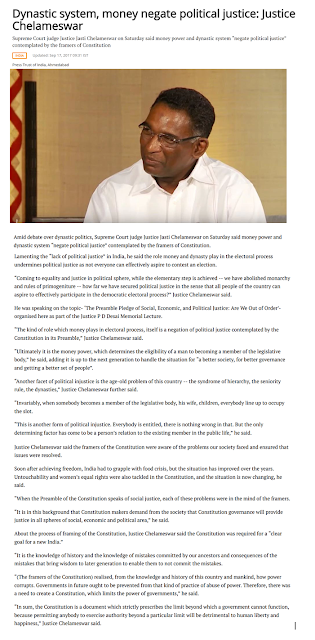The Preamble of The Constitution of India states ...
WE, THE PEOPLE OF INDIA, having solemnly resolved to constitute India into a SOVEREIGN, SOCIALIST, SECULAR, DEMOCRATIC REPUBLIC and to secure to all its citizens:
JUSTICE, social, economic and political;
LIBERTY of thought, expression, belief, faith and worship;
EQUALITY of status and of opportunity; and to promote among them all
FRATERNITY assuring the dignity of the individual and the unity and integrity of the Nation;
IN OUR CONSTITUENT ASSEMBLY this 26th day of November, 1949, do HEREBY ADOPT, ENACT AND GIVE TO OURSELVES THIS CONSTITUTION.
- Equality of status and of opportunity means all men are equal and can aspire for any political positions irrespective of caste, creed, color, or any thing which includes the so much talked about 'dynasty'. There is no way 'dynasts' can be relegated as 'untouchables' in independent India.
- It is no body's job to install or pave way for the ascending of aspiring common man occupy such positions. If the process has become so much cumbersome and expensive it is not the fault of 'dynasts'. It is our own political and social problem.
- Can we debar effective communicators like Modi, KCR etc paving way for so called aspiring common man? If 'dynasts' have some inherent advantages of their fore fathers and money that is their good luck. Everybody looks forward standing on the shoulders of their parents & grandparents. Nothing wrong in that.
- These days, money is playing decisive role in politics and it is due to failure of government, institutions and people themselves. Not the failure of constitution. Education, awareness and independent media are the keys.
- Social justice is not a goal or a dead end. In a good society there would be many above the thin line of 'Social Justice' and few below. The other way round like in India is worrisome. It is the responsibility of underprivileged to work hard and alleviate themselves and also the duty of Society and Government to extend helping hand to accelerate the same.
- Representative & Constitution based Democracy is neither perfect nor foolproof but is the least worst forms of Democracy. There is no such thing called ideal democracy.
- Extreme democracy, as practiced in 'small & rich' Switzerland too has many aberrations.
- The beauty of Indian democracy is that very often erring famous people encounter defeat and were sent into oblivion indicates its inherent strength and resilience. But that should not be a limiting factor in eradicating most of the ills the of society, if not all.
- As long as our economic policies aids corruption & capitalism in the name of 'rewarding the talent' and in reality rewards the rich, educated and perverted who will continue to become richer while poor will remain poorer resulting in Gini coefficient increasing beyond limits and eventually could result in social unrest and destruction of the nation.
- In a democracy 'Elected Executive' stands tallest of all. If institutions proactively doesn't control erring executive, at every step, democracy dies and authoritarianism erupts. The real power is with that person who control Money, Police & Military i.e. The Executive. Institutions have no jurisdiction over them. Where ever 'Elected Super Boss' subverts constitution and institutions, dictatorships have ruled those nations. It is imperative for people to elect good person to positions of power. People can't elect rogues to rule them and expect institutions to control him with checks and balances. Life doesn't work that way.
- Every undebated and nontransparent decision of Executive & Legislature must be subjected to judicial scrutiny prior to its implementation.
“If men were angels, no government would be necessary. If angels were to govern men, neither external nor internal controls on government would be necessary. In framing a government which is to be administered by men over men, the great difficulty lies in this: you must first enable the government to control the governed; and in the next place oblige it to control itself.” ― James Madison
Why do people vote for 'dynasts'? That is because familiarity of that family with the people and people enjoyed some benefits of their generosity in the past. Why do parties rally behind dynasts with in the party? That is because of their belief in their charisma to hold the party together. Without Sonia Gandhi or Rahul Gandhi at the helm of Congress party, it would disintegrate. As long as so called 'dynasts' have popular mandate, it is perfectly in order. What is wrong in standing on the shoulders of forefathers and looking forward? Which everybody does. Some years ago an ageing cricket batsman was asked when he would retire paving way for young aspirants. He said that he wouldn't do any such thing and it is for the young new cricketer to work hard and prove better than him and displace him. That answers the concept of merit, the underpin of democracy.



